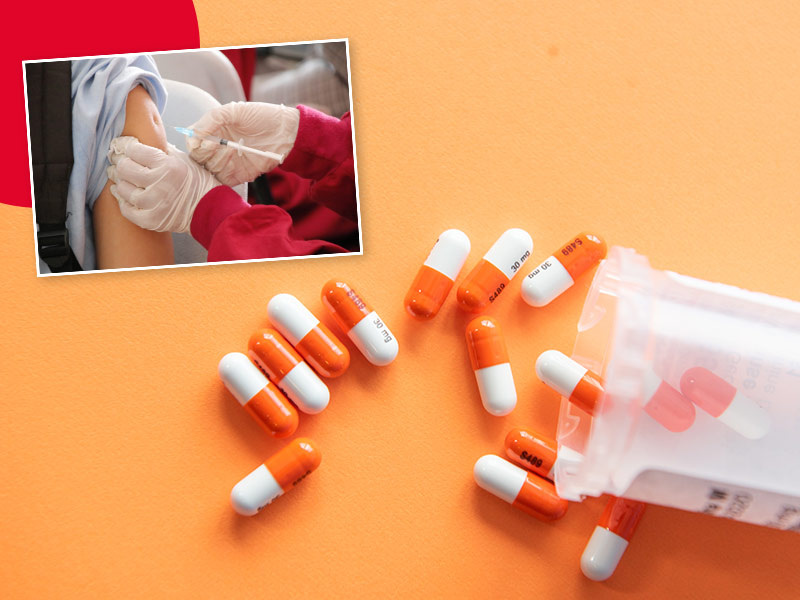
The COVID-19 vaccine developed by the US pharma major Pfizer generates a weak immune response in those on immunosuppressants. This is especially the case with those on TNF inhibitors, which is one of the 13 classes of immunosuppressants. A weaker immune response, both in terms of quality and duration until it last, was seen among those on TNF inhibitors when compared to healthy individuals and those on other immunosuppressants. The research was published in the journal ‘Med’.
Table of Content:-
The study involved 77 people on immunosuppressants. 12 were being given TNF inhibitors. For comparison, the immune response in 25 healthy individuals was also studied. The researchers studied the immune response against the novel coronavirus’ various strains, the original, alpha, beta, and delta. The response was checked first after three months, followed by five and six months.
Study Findings

(Photo Credit: Unsplash)
Here is what the study found out:
- The participants who were on TNF inhibitors had a weak and short-lived immune response after two doses of Pfizer’s COVID vaccine.
- Not only that, those on TNF inhibitors were at a greater risk of breakthrough infections. These cases are those in which fully-vaccinated individuals get infected.
- However, there's good news. The researchers said that those on TNF inhibitors can benefit from a third vaccine dose.
- Regarding people on other immunosuppressants, they had the same immune response, but of lower quality.
- Also, those on immunosuppressants had lower levels of a particular type of antibodies called neutralising antibodies, which are considered more potent in warding off the novel coronavirus.
- After three months, just 8% of healthy individuals had neutralising antibodies, whose quantity was so low as to be quite ineffective against the virus. The share was as large as 36% of those on immunosuppressants and 67% of those on TNF inhibitors.
- The situation worsened over time, i.e. after five and six months, and this was generally the case of those on TNF inhibitors.
Also read: UK Study Finds Link Between COVID Vaccines & Rare Neurological Disorders
Why Do People Take Immunosuppressants?

(Photo Credit: Unsplash)
As the name suggests, immunosuppressants are those drugs that suppress the body’s immune system.
- These are generally given in the case of transplants so that the body doesn’t reject the transplanted organ.
- It is also given to treat autoimmune disorders such as rheumatoid arthritis, lupus, psoriasis, etc.
TNF inhibitors are given to treat autoimmune disorders.
What Did The Authors Of The Study Say?
Michael S Diamond, MD, PhD, the Herbert S. Gasser Professor of Medicine and a senior author of this study said the following:
- "Not all antibodies are equally good at fighting viruses," he said.
- People on TNF inhibitors didn’t make enough of the potently inhibitory antibodies in response to the COVID vaccine.
- The potently inhibitory antibodies that they still made decayed by five months after receiving the second shot.
- Hence, those on TNF inhibitors, as compared to other immunosuppressed people, are at a greater risk of breakthrough infections, since immunity decreases with time.
- “Our data suggests that they should get boosted,” Professor Diamond said.
Also read: Does COVID Vaccine Improve Mental Health? Study Finds Out
Earlier Research
Two authors of this paper did earlier research. They found that 90% of people on immunosuppressants, including the TNF inhibitors, produced antibodies against the novel coronavirus. However, they only looked into whether the antibodies were present or not, and didn’t look into the quality as well as the duration till when the immunity lasts. These aspects were studied in the new research.
Countries, such as the United States, are giving a third dose of the COVID-19 vaccine, while several other countries are mulling it. As the name suggests, it’s the vaccine dose given to the fully-vaccinated individuals, who have received both their doses. India hasn’t made any such announcement. However, if this happens in the future, the immunocompromised and those with underlying health issues might initially get the third dose.
Photo Credit: Unsplash
Also watch this video
How we keep this article up to date:
We work with experts and keep a close eye on the latest in health and wellness. Whenever there is a new research or helpful information, we update our articles with accurate and useful advice.
Current Version
